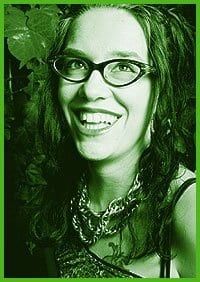In 1993, Michelle Tea ran away from her working-class home in Chelsea, Massachusetts and moved to San Francisco’s Mission District. The young woman soon found a home in the city’s queer and literary scenes and began reading at open mic events. Between 1993 and ’97 she took her poems, made photocopies and distributed a series of chapbooks. These early works, as well as poems that were never published, have now been collected for the first time in The Beautiful.
Tea is raw without being maudlin in The Beautiful, personal without being self-indulgent and simple without being tedious. (Okay, some people may find two stanzas inspired by a flea that landed on her paper a bit banal.) She scrutinizes the minutia of her life as well as the grandeur of the world around her. We’re invited to share her thoughts, meet her friends and family and travel the streets of San Francisco. Her rage, anxiety, pleasure and sadness are laid out like an emotional feast. By telling her everyday experience she addresses larger issues in society.
Each poem is lovingly crafted. The mishmash of material is more effectively communicated by being written in blank verse. Her writing seems to be random collection of ideas, but is restrained enough that you know it isn’t. It just seems as if every detail, every nuance is terribly important. The poems are real, intimate and most engaging.
Reading The Beautiful feels like glimpsing at Tea’s diary. One entry, “Crabs Are No Big Deal,” is about a case of pubic lice. “I don’t know which body/ the crab crawled off of/ tiny, grey and hard it/ lodged itself in the jungle/ of my crotch, multiplying/ slowly, feasting on blood or/ flakes of dead skin, whatever/ parasites prefer.” In “X-Girl,” she mouths off to the woman who dumped her. “I could slap you/ like a skinny mosquito/ nursing my arm, the relief/ of all you sucked/ hitting my skin, red. Was it like that,/ like food,/ take what you need/ shit the rest/ flush/ was I a burger or something?”
In the title poem, she talks about the dysfunctional relationship between herself and her country. “I could write you/ an anthem/ but you have/ so many/ fuck you/ america/ you’re just so/ emotionally/ unavailable/ you act like/ it’s everyone else’s/ fault, you’re a / really bad/ communicator/ and you have/ serious/ boundary issues.”
Since she began writing the poems collected in The Beautiful, Tea has become best known as the author of The Passionate Mistakes And Intricate Corruption Of One Girl In America, Valencia and her memoir, The Chelsea Whistle. She’s also the founder of Sister Spit, a “girl poetry road show,” and penned some “Adventure Girl” columns for On Our Backs.
The Beautiful shows us the beginning of that voice. Despite the grit and pain of some of these poems, what finally emerges is a sense of hope. As Tea concludes in “Pastry Tragedy,” “stoned all day/ wandering the streets/ with the other half-dead/ keep going, I just/ keep going.”
* Michelle Tea comes to Toronto on Tue, Apr 13 at the Drake Hotel to launch the anthology Pills, Thrills, Chills And Heartache which she co-edited with Clint Catalyst.
THE BEAUTIFUL.
Michelle Tea.
Manic D Press.
228 pages. $15.

 Why you can trust Xtra
Why you can trust Xtra


